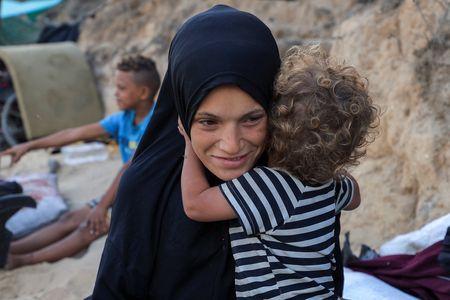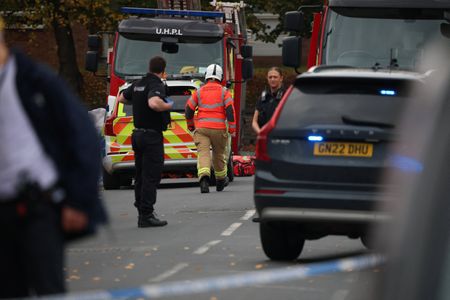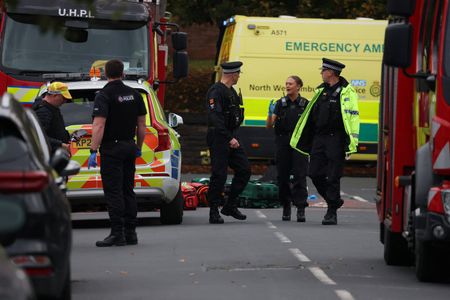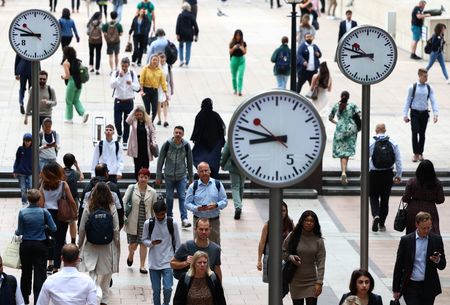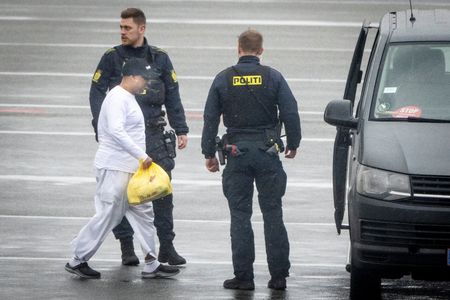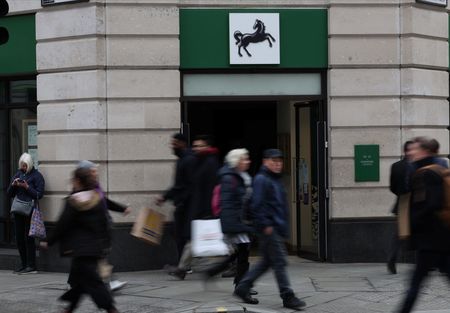GAZA (Reuters) -Nancy Abu Matroud has already lost three children during Gaza’s war.
Now, the Palestinian mother, 22, is fighting to save her daughter, Etra – a two-year-old cancer patient newly deprived of vital medical care: the children’s hospital treating her shut down last month during Israel’s latest offensive in Gaza City.
“We are just asking for a shelter,” Abu Matroud said. “I don’t want to lose the daughter I still have.”
A deadly mix of disease, displacement, lack of medical care and malnutrition has beset most Gazan families during the almost two-year-old war, but the turmoil has placed a particular burden on young children and pregnant women such as Abu Matroud.
She was six months pregnant with twins when, fleeing Israeli bombardment in Gaza City last month, she arrived in the central Gaza Strip after three days of walking, she said, along with her husband and Etra.
After the family reached Al Nuwairi area, her belly started to hurt and her waters broke, Abu Matroud recounted. She gave birth to her twins prematurely.
One of the twins died in Al-Awda Hospital in nearby Nuseirat. The second child was transferred to the infants’ department in Al-Aqsa Martyrs Hospital. After two days, that child also died, said a spokesperson for Al-Aqsa hospital, Khalil al-Daqran.
NOT ENOUGH HOSPITAL EQUIPMENT
Premature babies are exceptionally vulnerable to the pressures of Gaza’s war; in particular, there are not enough incubators and ventilators available to keep them alive, according to Jonathan Crickx, a spokesperson for UNICEF State of Palestine.
“There is an increase in the number of babies who are born premature,” he told Reuters. “The incubators needed to keep the baby in a protective environment… the ventilators that help them to develop their lungs, all of this equipment is not available in sufficient quantities today in the Gaza Strip.”
The children’s father, Faraj al-Ghalayini, 53, sits in the dirt by the side of a street, heating a can of chickpeas for two-year-old Etra on a fire he made using twigs.
“What is our fault? We have nothing to do with this. What is the fault of our children?” he said.
“God gave me a daughter, she is two years old now, and I was waiting for these two coming twins.”
Now the parents don’t know what will happen to their curly-haired daughter, who sits on a blanket on the roadside in a grubby stripy t-shirt and plays with a rag doll.
“We don’t know what to do, no one asks about us – no nation nor those from our own care about us,” said al-Ghalayini.
With resources exhausted amidst nonstop Israeli shelling, hospitals in Gaza have been forced to shut down. Only 14 out of 35 hospitals in the enclave are functioning, and those only partially, Crickx said.
The Israeli military told Reuters it continues to take steps to enable the provision of medical care and the ongoing activity of medical institutions in the Gaza Strip, in coordination with international humanitarian organisations.
DISPLACEMENT AND FAMINE
Most of the enclave’s around 2.2 million population have been displaced between the north and south several times during the war. Women moving from one place to another with no proper care are at a higher risk of undergoing premature birth, with malnutrition exacerbating the situation.
Famine was declared in Gaza City, the enclave’s largest urban centre, in August by global hunger monitor IPC, before Israel unleashed a long-threatened ground assault on the city, deepening the humanitarian crisis.
“UNICEF has treated in the month of August 13,000 (children) below the age of five for acute malnutrition, it is a very big number – among them, babies, premature babies,” Crickx added.
Abu Matroud said her four-year-old son from a previous marriage went missing at the beginning of the war. Losing the twins was another unbearable tragedy.
“I named the boy and the girl,” said Abu Matroud, who named her twins Mahmoud and Farida.
(Reporting by Dawoud Abu Alkas, additional reporting Mahmoud Issa, Writing by Nayera Abdallah; Editing by William Maclean and Ros Russell)

